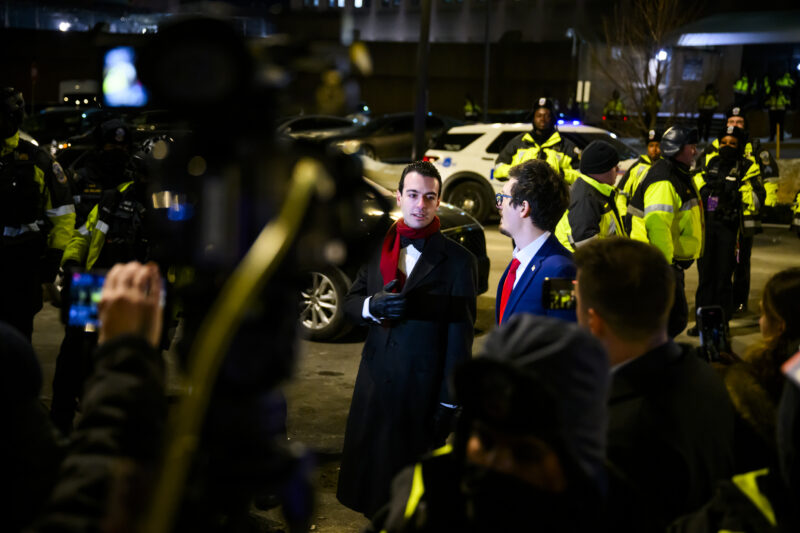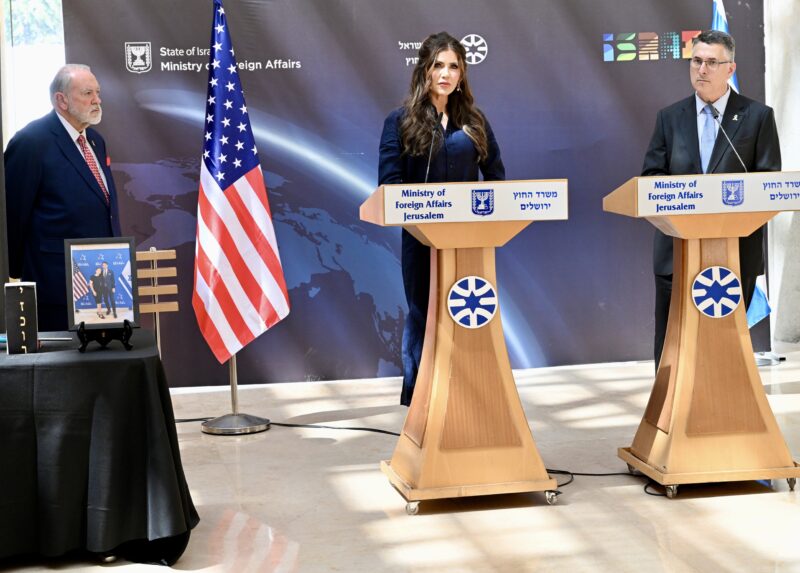The AJC’s response echoes the cautious, skeptical but critical approach it and other major nonpartisan Jewish organizations have taken towards Trump’s antisemitism policies

Win McNamee/Getty Images
President Donald Trump holds up a signed executive order in the Oval Office of the White House May 23, 2025 in Washington, DC.
The American Jewish Committee criticized President Donald Trump for his executive order barring travel into the United States for citizens of 12 countries as lacking “a clear connection to the underlying problem” of domestic antisemitism and potentially having “an adverse impact on other longstanding immigration and refugee policies.”
The administration framed the announcement as a response to the antisemitic terrorist attack in Boulder, Colo., carried out by an immigrant from Egypt who overstayed a work permit. The AJC’s response echoes the cautious, skeptical approach it and other major nonpartisan Jewish organizations have taken to other actions by the Trump administration to combat antisemitism, including revoking visas from international students and cutting funding from universities.
Trump signed the directive on Wednesday restricting travel from seven countries and outright banned travel from 12 others, arguing the move was necessary to prevent “foreign terrorists” and other national security threats from entering the U.S. The countries whose citizens are now banned from entering the U.S. are Afghanistan, Myanmar, Chad, Republic of Congo, Equatorial Guinea, Eritrea, Haiti, Iran, Libya, Somalia, Sudan and Yemen.
Some citizens of Burundi, Cuba, Laos, Sierra Leone, Togo, Turkmenistan and Venezuela will be restricted from traveling to the U.S. Egypt is not covered under the order.
In a statement released on Thursday, the AJC expressed gratitude that the administration “is trying to mobilize as many levers as it can to counter” the surge in antisemitic attacks while noting its concern that the “broad” order will “prevent those in need of real refuge from entering the U.S. in line with the longstanding American tradition of welcoming those forced to leave their countries to escape war, persecution, or natural disaster.”
“We fully agree with the administration that entry of foreign nationals who are not properly vetted and those who overstay visas can pose national security threats. Being able to enter and stay in the United States is a privilege, and thorough protocols to ensure entry of foreign nationals to the U.S. in a way that protects national security are vital,” the statement reads, calling for proper funding for the State Department to vet visa applicants.
The Trump administration is pushing for sweeping State Department funding cuts.
“Throughout AJC’s nearly 120-year history, we have supported fair and just immigration policies for people of all races, religions, and national origins, and advocated for an inclusive America that provides safe haven for those fleeing persecution and seeking to contribute to the United States. It remains our strong belief that it is possible to allow for just immigration and refugee policies while upholding the national security of the United States,” the statement continued.
The organization went on to urge the Trump administration to lift its suspension of the U.S. Refugee Assistance Program (USRAP), arguing that the pause had left “many already vetted and cleared applicants for asylum with little hope.” It also called for a refugee admissions cap no lower than 75,000.
Several major Jewish groups, including the Anti-Defamation League, pushed in the first Trump administration to overturn its travel ban policy, which targeted seven majority-Muslim countries. ADL did not provide comment on the new announcement.
Many progressive-minded Jewish groups have condemned the new travel ban.
President Trump could sign an executive order implementing the ban as soon as Wednesday, an administration official told a meeting of Jewish leaders

JIM WATSON/AFP via Getty Images
President Donald Trump signs an executive order in the Roosevelt Room of the White House on May 12, 2025, in Washington, DC.
The White House is considering issuing a new executive order banning travel to the United States from certain countries, resurrecting a controversial policy from President Donald Trump’s first term, according to three people who attended a Wednesday White House meeting where the plan was discussed.
The planned executive order was mentioned in a meeting at the White House with Jewish leaders. The meeting, which had several dozen attendees, was organized in response to the deadly antisemitic attack in Washington last month that left two Israeli Embassy staffers dead outside the Capital Jewish Museum. The briefing took place three days after an antisemitic attack in Boulder, Colo., injured 15 people at a march to raise awareness about Israeli hostages in Gaza.
White House Staff Secretary Will Scharf told the group about the order but did not mention which countries would be included in the ban. Scharf said Trump could sign the order as soon as Wednesday.
“They were just saying that an executive order regarding a travel ban is in the works,” one of the sources told Jewish Insider after the meeting. “Everyone was very careful about what they said and didn’t say.”
Another source said the planned order was “not directly because of the events in Boulder,” but that the attack in Boulder was mentioned “as a rationale, as proof of why this executive order was so important.”
The alleged perpetrator in the Boulder attack is an Egyptian national who is in the U.S. illegally, having overstayed his visa, according to the Department of Homeland Security. The suspect’s wife and five children were taken into Immigration and Customs Enforcement custody on Tuesday and were set to be deported to Egypt, but a federal judge on Wednesday halted deportation proceedings against the family members.
In 2017, days after taking office in his first term, Trump signed an executive order barring travel to the United States from seven Muslim-majority nations. Egypt was not one of them.
Speakers at the meeting included Susie Wiles, White House chief of staff; Harmeet Dhillon, assistant attorney general for civil rights at the Department of Justice; evangelical pastor Paula White and Jenny Korn from the White House Faith Office; Noah Pollak, senior advisor at the Education Department; Sebastian Gorka, senior director for counterterrorism at the National Security Council; Adam Boehler, U.S. special envoy for hostage response; Martin Marks, White House Jewish liaison; and Leo Terrell, chair of the federal antisemitism task force. Yehuda Kaploun, Trump’s nominee to serve as U.S. special envoy to monitor and combat antisemitism, was in the room.
Attendees at the meeting included a wide range of Jewish communal leaders, with representatives from Chabad, Jewish Federations of North America, the Anti-Defamation League, the Orthodox Union, American Jewish Committee, the Conference of Presidents of Major American Jewish Organizations, AIPAC, Agudath Israel and several Brooklyn-based Orthodox institutions.
A White House spokesperson did not immediately respond to a request for comment.







































